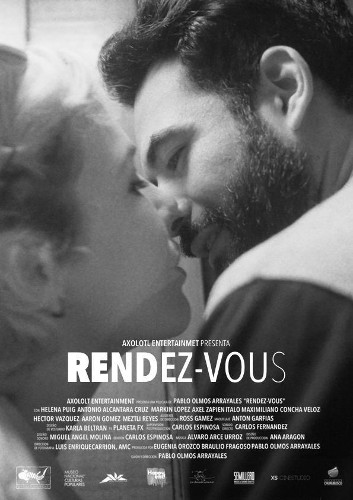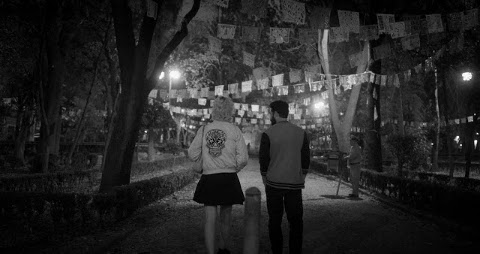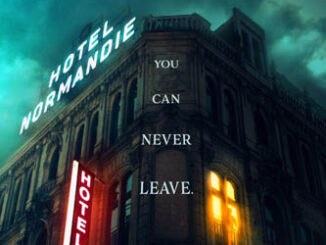Rendez-vous (2019)
Directed by: Pablo Olmos Arrayales
Written by: Pablo Olmos Arrayales
Starring: Aaron Gomez, Antonio Alcantara, Helena Puig, Italo Maximiliano Concha Veloz
MEXICO
AVAILABLE ON REGION 1 DIGITAL, no Region 2 release yet
RUNNING TIME: 107 mins
REVIEWED BY: Dr Lenera

Lili stands on a street corner waiting for Eduardo. She’s been chatting to him on an internet dating site and has got to like him, but he’s now thirty-five minutes late for their first date and she’s not impressed. Suddenly Eduardo shows up and says that he was mugged, which included having his phone taken. She believes him, and they spend some time walking about Mexico City getting to know each other. Even if he seems a bit evasive, she’s getting the hots for him and is happy to go back to his place for dinner. There, however, she finds out that he’s been lying to her and that his plans for her aren’t of the romantic or sexual kind….

The idea of a film shot entirely in one take or looking like it’s shot in one take isn’t new, this particular picture perhaps inspired a bit by C’était un rendez-vous [It Was A Date] from 1976 which most definitely did consist of one take, the camera stuck to the front of a car as it drove through Paris for eight minutes. But there’s no doubt that it’s become employed surprisingly often in more recent years, with the style often becoming part of the publicity in order to appeal to the kind of cineaste where the method of filming itself can be more important than things such as plot and character. The likes of 1917, Birdman and Russian Ark consisted of very lengthy takes and hard-to-spot edits, and are now joined by Pablo Olmos Arrayales’ Rendez-vous, which, as far as I can tell, really does look like it is is all one take, digital technology now making this possible. What is perhaps more remarkable though is that Arrayales and his crew only got one chance at shooting it because they only had a very small budget to play with. Obviously this means that a lot of precise planning and rehearsal would have been required, but it’s still no mean feat seeing how polished the final product is. And what’s also surprising is that, after a while, you may forget that you aren’t seeing any cuts, because the filming is pretty smooth and even unobtrusive for a lot of the time; no show-offy stuff that screams “Hey, look at me”, and thankfully no vomit cam either. Yet it’s also a project where it seems a lot of improvisation took place, resulting a raw kind of freshness.
On the list of screeners that we have, Rendez-vous is called a ‘dark romance’, and I suppose if you had to categorise it you could call it that, though it’s not the description I would have used, and the fact that it consists of two very distinct halves may irritate some viewers, though I tend to like it when a film suddenly becomes something very different to what it initially seems like it is. Folk expecting a horror film because of it being shown at this year’s online version of Grimmfest might sit through much of the first half twiddling their thumbs, but believe me when I say that things do become tense, they become surprising and they even become nasty. The first half an hour or so is very much in the vein of Before Sunrise, with a young couple getting to know each other in a manner that feels much more real than in your typical movie romance. As the scene switches from the streets of Mexico City, a city where “every ninety minutes somebody goes missing” to inside an apartment, the feel continues, though it’s subtly undercut by some details that don’t seem right though some of these are details that you may not notice if you’re not concentrating totally on what you’re watching. Then suddenly things switch to intense mode and one can only admire a screenplay that’s brave enough to keep a lot of things ambiguous while still delivering some of the tried and tested beats that expect, with only some hard-to-believe aspects of the story threatening to undo all the effort that has been put in to make this micro-budgeted piece as effective and interesting as possible, despite the obvious limitations of its main setup which eventually reveals itself half way through.
The noise of birds singing is the first thing that we hear, beginning an expertly balanced use of sound that’s maintained throughout the whole film. It’s possible that some of it was dubbed on in post, but it felt real to me and that’s all that mattered. The sound of traffic moving in a big city gradually takes over as the opening shot is of hands texting words which materialise on the screen. “Hey, are you there”? “You OK”? The texter is Lili and her date is not only late but hasn’t even texted to tell her, something which took me back to the days before mobile phones, when you’d arrange to meet someone on a certain day at a certain time in a certain place and basically just hope for the best. She texts a friend her terrible predicament, but then he appears, with a story about how he was mugged. As well as not having no phone he has no money and is embarrassed about not being able to pay the entry fee for the museum they’d decided to visit, but she’s not bothered about that, and clearly likes him even more in the flesh than she did on the internet seeing as she links his arm with hers. The film crew probably weren’t allowed to shoot inside the actual museum, so the camera remains outside to slowly track down one side of it before rejoining our couple as they exit, breaking for a moment the almost cinema verite style because they would clearly have been inside the place for far longer than a couple of minutes, but never mind, we like these two and are intrigued by this dynamic that we’re seeing even though it could have already gone a bit wrong, what with his surprise at her strong reaction to a painting, saying to her that he didn’t expect her to be “deep”. And then there’s his vague answering of her questions, such as “What do you do for a living”? being responded to with “I search”. Lili doesn’t deem it right to push things like that and lets them slide.

Helena Puig and Antonio Alcantara are terrific in these early scenes, their acting being quite detailed yet subtle. On a couple of occasions I think I was able to spot when something improvised was going on, judging by the reaction of the other person which seemed to real to be pretend. We get a nice, almost impressionistic flavour of the city as the camera usually remains in front of the two while they pass various musical sounds, learn what the Tradition of the Lucky Canary is and encounter a girl selling cupcakes and drugs. She’s more of an improvisor, he prefers to plan. She’s open about who she is and what she wants while he’s more guarded. She seems much more experienced than him, even trying women, and makes her increasing attraction to him very obvious, while the only woman he mentions is a childhood crush whom he went out just once, and seems somewhat shy. She takes no persuading to go back to his apartment, but when he pours them some wine he doesn’t drink from his glass, though he drinks hers after some talking into it. He has a lot of crime novels on his bookcase, though my DVD and Blu-ray collection would probably be far more off-putting to a female guest [thank goodness all my discs take up what would have been the third bedroom]. But then his phone buzzes, and has to confess to her that he wasn’t mugged; in actual fact he fell asleep and rushed out without phone or money but was too embarrassed to tell her. And our attention is drawn to a gun hidden behind the sink while he puts something in her next glass of wine. There’s a terrific, Alfred Hitchcock-style shot of the glass in the foreground, looking like it’s slightly bobbing about on thin air due to the handheld camera movement and the table being below the frame, while Lili and Eduardo are sitting on the settee in the background. We don’t see enough of such simple, direct visual enhancement of a situation these days.
She becomes very forward but is immediately afterwards put off by his rather maniacal laughing. She then tries to leave but can’t, instead collapsing onto the floor and waking up in a dark room tied to a chair – just like the heroine of the Grimmfest entry I watched two days ago, though thankfully this one goes off on a different path. Indeed Arrayales, who also wrote in addition to directing, is able to give us some familiar situations while also trying some new things. Things do state very close to being ‘torture porn’ for a while, with one particular moment of violence that may make you winch; it’s one we’ve seen often in films but it almost always has a strong effect whether shown or cut away from so we just hear it [here it’s shown]. Eduardo is somebody who doesn’t normally do this sort of thing and we can understand the pain he suffers and the reason why he’s doing this to Lili, even if we don’t agree with it. At a couple of points we’re even asked to wonder who the real villain is, and much ambiguity arises about Lili, with question marks sticking in our heads as the end titles come up. Some developments are predictable and some are rather silly, such as when Eduardo basically gives himself away to a next door neighbour’s kid when he didn’t need to; I’m not going to describe the exact situation and how he does this but it’s pretty unbelievable. If we’re supposed to take it as another sign that he’s losing it, then we needed stronger acting with Alcantara, despite being so good earlier, not quite having the acting chops to pull his part off while Puig struggles in a few later spots too, especially when she’s also required to act oddly. Saying that, I do wonder if the film would have been better if it had just stuck with Lili and Eduardo and developed further their odd relationship into more bizarre and twisted ways, rather than relying on the appearances of some extra characters to propel the plot in contrived ways.
Still, the film looks darn good despite being shot with in black and white with a cheap digital camera, with lots of strong use of blacks in the second half that almost recalls the film noir of old – and if you’ve been reading my reviews for long enough you’ll know how much I love that kind of stuff. Cinematographer Nuis Enrique Carrion has obviously done his very best with what he had, and has also tries his best to be unobtrusive; for some sections, it almost feels like you’re watching a more conventionally shot piece. When Lilla and Eduardo are in a large room and quite far away from each other, the camera by necessity has to go back and forth between the two characters, but it does its best to not be too obvious. From a technical standpoint Arrayales has achieved something pretty impressive with Rendez-vous. In fact despite a few really nagging story points that may not bother others as much, Rendez-vous is pretty impressive overall, even though I can’t get rid of the probably illogical feeling in my head that I’d have been perfectly happy if Lili and Eduardo had just carried on walking and talking – which I guess is both a good and a bad thing, though it probably throws my credentials for being a film reviewer for a website called Horror Cult Films straight out the window.
Rating: 














Be the first to comment